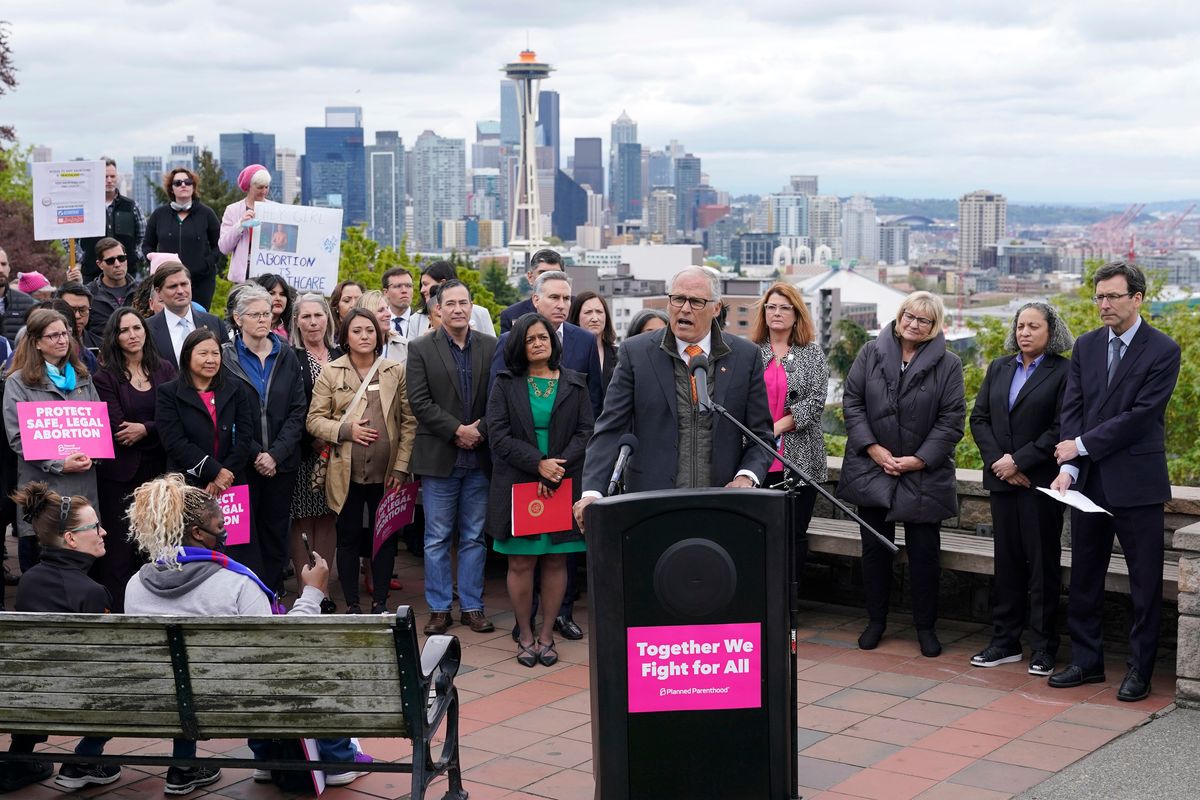‘They will be welcome’: Inslee, Washington Democrats commit to ‘sanctuary’ for those needing abortions in other states

OLYMPIA – Gov. Jay Inslee and other Democratic leaders pledged on Tuesday to maintain Washington as a safe place for those needing access to abortion.
“Washington state was a pro-choice state, Washington state is a pro-choice state, and we’re going to fight like hell to keep Washington a pro-choice state,” Inslee said.
The governor, abortion rights advocates and Washington lawmakers, including Attorney General Bob Ferguson and Congresswomen Marilyn Strickland and Pramila Jayapal, rallied for abortion rights, following a leaked Supreme Court majority opinion that would strike down the right to abortion established in Roe v. Wade. The opinion is not official and could change before the Court rules in the coming months.
Inslee, joined by a number of other Democratic politicians in Kerry Park in Seattle, said Washington will become a “sanctuary” for those who need it, he said.
“They will be welcome,” Inslee said.
Jennifer Martinez, Planned Parenthood Alliance Advocates president, said Tuesday the decision to have an abortion is “intimate, huge and it is not without consequence.”
“To have that right simply taken away is not devastating,” she said, “it is abhorrent.”
Washington already has seen an influx of patients from other states with stricter laws, such as Idaho, who are in need of an abortion.
If Roe v. Wade is overturned, the number of people coming to Washington will only increase. According to the Guttmacher Institute, Washington could see a 385% increase in people who drive from other states (mostly Idaho and Montana) for abortion care if Roe is completely overturned. The Guttmacher Institute is one of the largest reproductive health research organizations in the country and is considered a supporter of abortion rights.
In Idaho, abortion is currently restricted after the “viability” stage of a pregnancy, around 24 weeks of gestation. That same timeline is in effect in Washington, but patients in Idaho have more hoops to jump through, such as receiving state-directed counseling and waiting 24 hours afterward before they can proceed with the abortion.
Idaho has followed a number of other states in recent years in passing stricter abortion laws that would go into effect if the U.S. Supreme Court overturns Roe v. Wade.
One “trigger law” in Idaho would ban all abortions except in cases of rape, incest or to protect the life of the mother. It would take effect 30 days after the Supreme Court decision.
The Idaho Supreme Court last month temporarily halted a separate abortion law that would restrict abortions at six weeks of pregnancy and allow relatives of the fetus to sue abortion providers for a minimum of $20,000 within four years of the abortion, according to the Associated Press.
The Washington Legislature last session passed laws to strengthen the state’s protection of abortion access .
Physician assistants, advanced registered nurse practitioners and other health care providers acting within the provider’s scope of practice can perform an abortion starting in June, after the passage of one such law.
More than 50% of counties in Washington don’t have a known abortion clinic, according to the Guttmacher Institute.
Allowing more providers to perform abortions can expand the number of people who have access to them, House Speaker Laurie Jinkins, D-Tacoma, said at Tuesday’s rally. The laws passed this year ensure that health care providers everywhere in the state who are trained to do so can provide abortion services.
“You can have that choice theoretically, but if you really don’t have access to health care, you don’t have that choice,” she said.
The new law also prohibits the state from penalizing, prosecuting or taking adverse action against an individual based on the individual’s “actual, potential, perceived or alleged pregnancy outcomes,” or against those assisting individuals seeking an abortion. It also changes the word “woman” in statute to “pregnant individual.”
“But even though our state was prepared for this erosion of rights, now that this moment has apparently arrived, it is no less shocking,” Senate Majority Leader Andy Billig, D-Spokane, said in a statement. “Our state will remain a beacon for choice and welcome people from other states who are being denied their right to choose.”
Senate Minority Leader John Braun, R-Centralia, acknowledged in a statement that the Supreme Court opinion does not change much in Washington, as current law provides opportunities for abortion procedures.
“Whatever the law, whatever your politics, fewer abortions should be a common goal,” Braun said in a statement.
Braun also criticized the leak of the draft opinion, calling it an “unscrupulous attempt to manipulate public opinion” that will intensify the debate over the issue.
Inslee said lawmakers should do more to protect abortion access by exploring a protection of abortion in the state constitution. That could happen in two ways, Inslee said.
One option is the state Supreme Court could rule that the right to abortion exists under privacy, similar to the federal Roe ruling. That requires litigation and time, he said.
The other option is to amend the state constitution, which would require approval from two-thirds of both the state Senate and state House. That would require some support from Republicans. Any passed constitutional amendment would then go to the general election ballot and need a simple majority to pass.